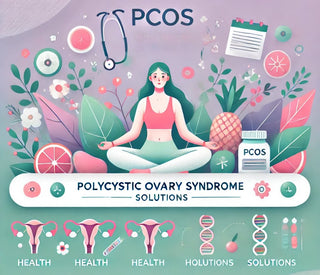Polycystic Ovary Syndrome (PCOS) is a complex condition that affects women of all ages, often leading to physical, hormonal, and emotional challenges. While PCOS is frequently associated with irregular periods and fertility issues, it is more than just a gynecological concern. It affects various systems of the body, including metabolism, hormone regulation, and mental health.
For many women, managing PCOS can feel like navigating a puzzle, as symptoms vary widely from person to person. While some women with PCOS experience weight gain, acne, and fertility difficulties, others may not show typical signs like ovarian cysts. It's essential to recognize the underlying causes of PCOS, including insulin resistance, hormonal imbalances, and gut health issues, to provide a more comprehensive treatment plan.
Understanding PCOS: The Role of Insulin Resistance

At the core of PCOS lies insulin resistance, a condition where the body's cells become less responsive to insulin, a hormone that helps regulate blood sugar levels. As a result, the body produces more insulin to compensate, which can lead to an imbalance in various hormones. This disruption can trigger a series of issues, including:
- Irregular periods or anovulation
- Weight gain, especially around the abdomen
- Acne and oily skin
- Hair loss or thinning, particularly on the scalp
- Excess facial and body hair (hirsutism)
- Mental health concerns, such as anxiety and depression
If left unchecked, insulin resistance can increase the risk of developing more serious conditions, such as type 2 diabetes, fatty liver disease, high blood pressure, and cardiovascular diseases.
The Link Between Insulin and Hormonal Imbalances
When insulin levels are elevated, they interact with other hormones in the body, particularly luteinizing hormone (LH). This combination increases the production of androgens (male hormones such as testosterone and DHEA) in the ovaries. Elevated androgen levels contribute to many of the hallmark symptoms of PCOS, such as:
- Disrupted ovulation and irregular periods
- Excess hair growth (especially on the face and chest)
- Male-pattern hair loss
- Skin issues like acne
Contributing Factors to PCOS: Thyroid, Gut Health, and Environmental Pollutants

Thyroid Function and PCOS
The thyroid, which regulates metabolism and hormone function, plays a significant role in PCOS. Studies show that women with PCOS are more likely to experience thyroid disorders, such as subclinical hypothyroidism or autoimmune thyroid diseases like Hashimoto's thyroiditis. These thyroid imbalances can worsen symptoms of PCOS, including insulin resistance and reproductive issues.
- Women with PCOS are 2.5 times more likely to develop thyroid disease compared to women without PCOS.
- Subclinical hypothyroidism, characterized by mildly low thyroid hormones, is particularly common in women with PCOS and can worsen metabolic issues like weight gain.
Gut Dysbiosis and PCOS
Emerging research highlights the link between gut health and PCOS. An imbalance in the gut microbiota, known as gut dysbiosis, is commonly seen in women with PCOS. This imbalance can increase inflammation, insulin resistance, and elevated androgen levels, exacerbating PCOS symptoms. Some strategies to improve gut health include:
- Consuming prebiotic and probiotic-rich foods
- Increasing dietary fiber intake
- Focusing on a balanced, nutrient-dense diet
Environmental Pollutants
Environmental toxins, such as endocrine-disrupting chemicals found in plastics (e.g., BPA), pesticides, and other pollutants, have been linked to PCOS. Studies indicate that women with higher levels of pollutants, particularly those with elevated androgen levels, may experience worsened symptoms of PCOS. Reducing exposure to these chemicals through lifestyle changes can be beneficial in managing PCOS.
Strategies for Managing PCOS: Diet, Exercise, and Lifestyle

The key to managing PCOS lies in addressing insulin resistance and hormonal imbalances. This can be achieved through a combination of diet, exercise, and lifestyle changes. Here’s how:
- Diet
Eating a nutrient-rich, whole-food diet is essential for regulating blood sugar levels and hormones. The following dietary strategies can be especially beneficial for women with PCOS:
- Eliminate ultra-processed foods: These foods are often high in refined carbohydrates and sugars, which spike blood sugar levels and exacerbate insulin resistance.
- Prioritize vegetables and healthy fats: Aim for 75% of your plate to be filled with vegetables, with the remaining 25% consisting of high-quality protein and healthy fats.
- Increase fiber intake: Fiber-rich foods help regulate blood sugar and support gut health. Opt for organic fruits, vegetables, and whole grains.
- Incorporate GLP-1-boosting foods: These foods, such as bitter melon, green tea, and dark chocolate, can help improve insulin sensitivity and support metabolism.
Key supplements that may support insulin sensitivity include:
- Berberine: Known to regulate insulin and improve glucose metabolism.
- Inositol: A supplement that can improve insulin sensitivity and regulate glucose levels.
- Vitamin D: Deficiency is common in women with PCOS and can worsen insulin resistance.
- Exercise
Regular exercise can help improve insulin sensitivity and reduce symptoms of PCOS. Here are some beneficial exercise practices:
- Moderate-intensity exercise: Activities like walking, cycling, or swimming can help reduce insulin resistance and improve cardiovascular health.
- Strength training: Building lean muscle through weight training can enhance insulin sensitivity and support a balanced metabolism.
- Lifestyle
Lifestyle factors, such as sleep, stress management, and toxin exposure, significantly affect hormone balance. Consider these lifestyle strategies:
- Reduce plastic exposure: Avoid plastics with recycling codes 3, 6, and 7, which may contain hormone-disrupting chemicals like BPA.
- Manage stress: Chronic stress can worsen hormonal imbalances. Practices like meditation and deep breathing can help regulate cortisol levels.
- Prioritize sleep: Aim for 7-9 hours of sleep per night, as good-quality sleep is essential for hormone regulation.
Diagnostic Testing for PCOS
If you're experiencing significant symptoms of PCOS, it’s important to get tested for the following:
- DHEA-S and testosterone: Elevated androgen levels are common in PCOS.
- Insulin response and hemoglobin A1c tests: These tests assess insulin sensitivity and blood sugar control.
- Thyroid function: Testing for thyroid hormones (TSH, T3, T4) can help rule out thyroid dysfunction.
- Prolactin levels: This test helps rule out other conditions that mimic PCOS.
- Lipid profile: Measures cholesterol and triglyceride levels, helping to assess the risk of cardiovascular disease.
Conclusion
Managing PCOS is a holistic process that involves addressing the root causes of the condition, including insulin resistance, hormonal imbalances, thyroid function, and gut health. Through diet, exercise, and lifestyle modifications, many women with PCOS can experience significant relief and regain control of their health. Regular testing and working with a healthcare provider are key to developing a personalized treatment plan that effectively addresses the unique challenges posed by PCOS.
References
- Herman R, Sikonja J, Jensterle M, et al. Insulin Metabolism in Polycystic Ovary Syndrome: Secretion, Signaling, and Clearance. Int J Mol Sci. 2023; 24(4):3140.
- Brutocao C, Zaiem F, Alsawas M, et al. Psychiatric disorders in women with polycystic ovary syndrome: a systematic review and meta-analysis. Endocrine. 2018; 62(2):318-325.
- Fan H, Ren Q, Sheng Z, et al. The role of the thyroid in polycystic ovary syndrome. Front Endocrinol (Lausanne). 2023; 14:1242050.
- Glintborg D, Rubin KH, Nybo M, et al. Increased risk of thyroid disease in Danish women with polycystic ovary syndrome: a cohort study. Endocr Connect. 2019; 8(10):1405-1415.
- Raj D, Pooja F, Chhabria P, et al. Frequency of Subclinical Hypothyroidism in Women With Polycystic Ovary Syndrome. Cureus. 2021; 13(9):e17722.







